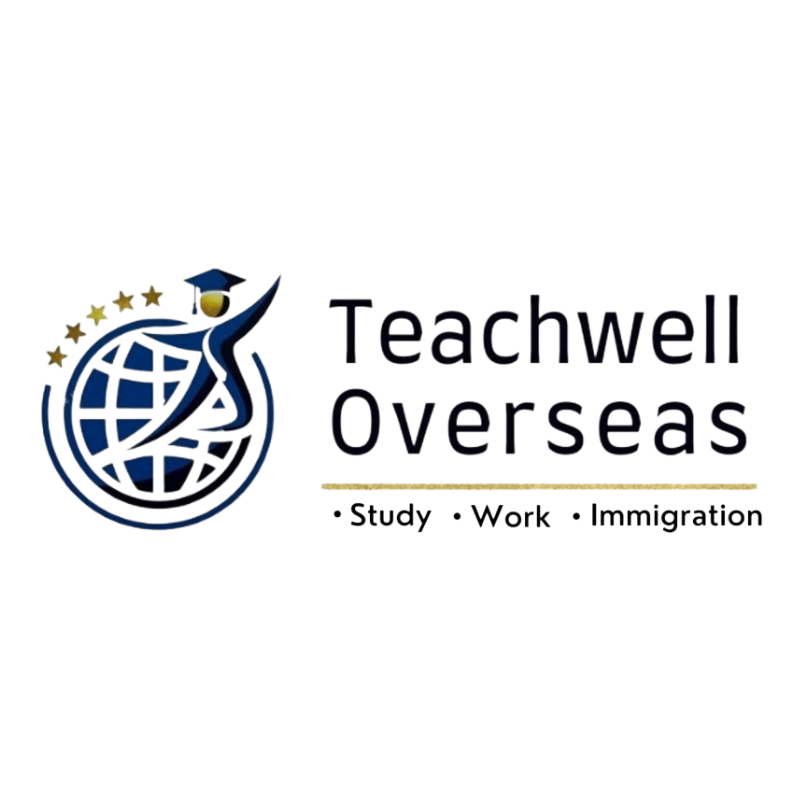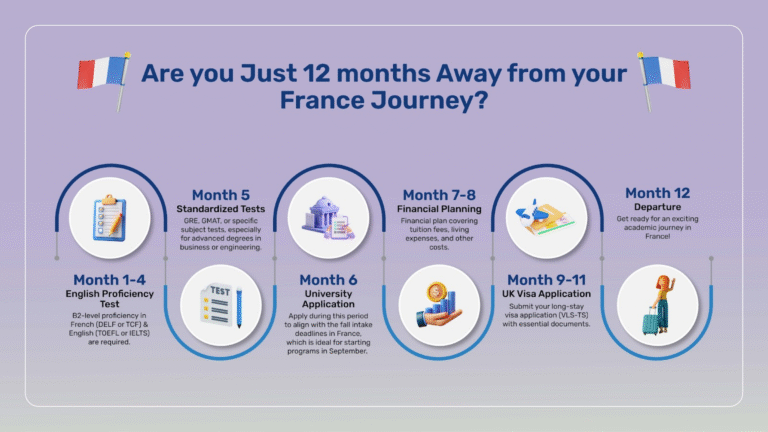Study Abroad Consultants In Delhi
- support@teachwell.co.in
- +91 93103 80899
- support@teachwell.co.in
- +91 93103 80899

Study in France: Scholarships, Cost of Living, and Job Opportunities
Known for its cultural sophistication, arts, culinary tradition and intellectual legacy, France ranks among the most desirable destinations for study abroad. Approximately 400,000 international students come to France to study each year, making it the 7th most popular study destination in the world. France has a unique range of academic programs, such as engineering and business management, as well as fine arts and culinary design, to support varied career goals.
Students who wish to continue their studies abroad not only create academic credibility, but also tend to make the study experience affordable through available scholarships, low tuition fees, and the prospect of part-time work. This comprehensive guide to studying in France makes an assessment of everything from tuition and cost of living in France to job opportunities following studies which keep France an attractive study destination.

Why Choose France for Higher Education?
France is not just known for being a place of fashion, romance, and haute cuisine — it is also a worldwide centre of education and innovation. The French system of higher education emphasizes creativity, analytical reasoning, and practical learning and their universities and Grandes Écoles are consistently ranked among the very best in the world, based on a very good standard of excellence in research and teaching quality.
Here are five factors that make France a great place to study:
Globally recognised degree: French degrees are well accepted and respected, throughout the world, particularly in business, engineering, design and social sciences.
Tuition: Public universities or grandes écoles in France have very low fees for higher education, even for international students.
Access to scholarships and funding options: A range of funding options make education accessible to students from different socio economic circumstances.
Cultural diversity: France is home to students from over 180 countries, representing a rich multicultural backdrop.
Work opportunities: The government encourages international graduates, with flexible visa and work options.
In addition, France is centrally located in Europe and close to Germany, Italy, and Spain, allowing students to explore Europe while studying.
Understanding the French Education System
The French system of education is known for being organized and specialized. There are primarily three types of institutions for undergraduates in France: Public Universities, Grandes Écoles, and specialized schools.
Public Universities: Public universities receive funding from the French government and offer degrees in every area of study, often at very low tuition costs.
Grandes Écoles: These prestigious schools have an emphasis on engineering, business, and public sector management and have selective admission as well; however, career prospects upon graduation are strong.
Specialty schools: These schools mainly award degrees in very specialized areas such as art, fashion, culinary arts, and design. Le Cordon Bleu and L’Institut Français de la Mode are among the most famous institutions in the world.
Courses in France fall under the LMD system (Licence-Master-Doctorate) which parallels the Bachelor’s-Master’s-PhD qualifying system. Many courses are provided in English, especially Master’s qualifications, and even these courses are already relatively manageable for students from outside France.
Explore more guides on studying abroad and finding top scholarships! Read More
Scholarships in France for International Students
Why Scholarships Matter for Global Learners
When studying abroad, you need to think ahead about how you will fund your experience. France is usually more economical when it comes to tuition compared to other popular choices. However, living and studying abroad will come at a cost. This is where having scholarships to provide financial relief is important. You will be able to worry less about finances and spend your time and energy on your studies and self-development.
France’s commitment to making education accessible is evident in the wide range of scholarships available to assist students for studying in France including scholarships offered by the French government, the universities, private foundations, and international organizations. There are funding opportunities for every degree level, whether you are applying for a bachelor’s degree, a master’s degree, or a doctorate.
Major Government-Funded Scholarships in France
Eiffel Excellence Scholarship Program
This scholarship, which is awarded by the French Ministry for Europe and Foreign Affairs, is one of the most prestigious scholarships. It supports outstanding international students who will be pursuing master’s and PhD programs in the fields of engineering, law, political science and management disciplines.
Coverage: Monthly allowance (€1,181 for master’s, €1,700 for PhD) as well as health insurance, and international flight ticket expenses.
Duration: Up to 36 months (depending on program).
Campus France Scholarships
Campus France administers hundreds of scholarships funded by the French government, governments of the regions, and higher education institutions. They provide an all-in-one place for international students interested in funding opportunities.
Erasmus+ Scholarships
Erasmus+ is an initiative of the European Union that offers students the opportunity to study or have an internship in France as part of their degree program. It provides mobility grants to cover the students tuition, accommodation and living expenses.
Charpak Scholarship Program
This scholarship is administered by the Embassy of France in India for Indian students studying undergraduate and postgraduate degrees in France. It covers tuition fees and visa fees, as well as monthly stipends.
Make Our Planet Great Again Scholarship
This scholarship is for students who have a focus on environmental science and sustainability, it is looking for students who comply with France’s international commitment to climate action.

University and Institutional Scholarships
French institutions award numerous scholarships for international students to help acknowledge and reward academic excellence and leadership capabilities.
HEC Paris Excellence and Diversity Scholarships: Scholarships are awarded to MBA and masters’ students whose leadership and academic performance has stood out.
Sciences Po Emile Boutmy Scholarship: Scholarships are awarded to students from non-EU countries in amounts ranging from €5,000 to €10,000 annually.
École Normale Supérieure (ENS) International Selection: This scholarship is awarded to high-achieving international students who are interested in completing advanced training in research.
INSEAD Diversity Scholarship: Students from underrepresented regions are the beneficiaries of the INSEAD diversity scholarship to study business in France.
Grenoble Ecole de Management (GEM) Scholarships: These are merit-based scholarships awarded to worthy candidates in amounts up to 50% off tuition.
These scholarships address the students’ financial stress, as well as add academic merit and potential to the students’ resume.
Check official France scholarship and visa updates for 2026 intake! Visit Now
Cost of Living in France: What to Expect
Tuition fees in France are inexpensive; however, the cost of living varies greatly by city. Overall, Paris is the most expensive city, then Lyon, Bordeaux, and Toulouse. The cheapest cities to live in are typically smaller cities such as Nantes or Lille.
Average Monthly Expenses
Accommodation: €350–€800 (for dorms or private accommodation)
Grocery / Food Costs: €200–€400
Transportation: €30–$75 (there are student discounts for the metro pass)
Utilities and Internet: €50–€100
Miscellaneous: €100–€200.
In general, most international students will require a total of €900–€1,500 a month.
The French government has CAF (Caisse d’Allocations Familiales) that is a housing benefit, and can reimburse you up to 40% of your rent depending on your financial circumstances. Applying for CAF can have a significant impact on how much you have to pay monthly.
Job Opportunities for Students and Graduates
Part-Time Work While Studying
With a legitimate residence visa, international students can work up to 964 hours each year (which is about 20 hours a week). The minimum wage is approximately €11.65 per hour, so students could earn as much as €800-€900 per month. There are many different options for part-time work, including:
Cafés, restaurants, and retail stores.
Jobs on campus such as a library assistant or something in the office.
Tutoring English or other subjects.
Freelancing, especially if you have a creative or technical skill set.
All of these are great ways to get useful experience, practice the language you are studying, and earn extra money.
Internships and Industry Experience
In many French degree programs, internships (stages) are mandatory, particularly in engineering, business and design subjects. Internships provide students with valuable exposure to industry, and are often paid — in amounts anywhere from €500-€1,200 a month.
Students in master’s programs often find that internships turn into full-time employment, providing valuable experience that gives them a leg-up after graduation.

Post-Study Work Visa and Employment After Graduation
Once students have obtained their degree, they have the option to apply for the APS (Autorisation Provisoire de Séjour). This is a short-term or temporary residency status that permits them to remain in France for an additional twelve months for purposes of job search.
If international students obtain a job offer for a salary that is at least 1.5 times the minimum wage, they can change their status to that of work visas (Carte de Séjour Salarié).
Key employment areas and scope include:
Information Technology and Engineering
Service Industries: Business & Finance
Luxury and Fashion Management
Aerospace and automotive
Tourism and Hospitality
Many of France’s multinational corporations — including L’Oréal, Airbus, Dassault Systèmes, BNP Paribas, and Capgemini — have active recruitment of international students to utilize their many talents.
The Cultural Experience: Life Beyond the Classroom
Studying in France is more than just studying — it is a cultural experience or living. France is full of cultural experiences: from world-known tourist attractions like the Eiffel Tower to the cute café culture in Lyon and the country-side vineyards in Bordeaux. There is always something to experience or explore with regard to living.
International students usually refer to France as a place of sophistication that is warm and welcoming. France is a país with joie de vivre — the joy of living. The essence of joie de vivre is displayed in its art, fashion, festivals, and cuisine.
Cost of living can be a friction point for some international students — however, many students take advantage of many student discounts offered in several areas, including public transportation, cinema tickets, and museum tickets. Many universities may include student unions, clubs, and cultural festival activities or groups, which further ease the challenge of international students into French university life and provide them with lifelong friendships.
Learning the French Language: A Career Advantage
Although a lot of courses are offered in English, learning French is a major benefit. It increases your chances of employment in France and elsewhere because French is one of the most widely spoken languages in the world.
Many universities and local organizations offer low-cost French language classes to international students. Learning the French language can also increase the number of internships and part-time jobs available to students, and more opportunities for new friendships and social experiences.
Preparing for Your Study in France Journey
Step-by-Step Guide
Investigate and Select a Degree:
Refer to the Campus France website for its lists of qualifying universities and degrees.
Begin Application for Scholarship:
Do this early, as scholarship deadlines vary between academic institutions.
Gain Admission:
Make sure that you have a solid academic transcript, language exam scores and a Statement of Purpose.
Start a Student Visa Application After Gaining Admission:
After being accepted into an academic program, students apply for the VLS-TS visa. This visa allows part-time work and multiple entries.
Consider Housing and Finances:
Consider housing options for students (often it is best to research and apply for subsidized housing with CAF if qualifying).
Acquire Useful French Language Skills:
Even if you are conversationally fluent, at least the basics of everyday life will be helpful.
Complete Registration Upon Arrival in France:
Students will need to register with the university, as well as validate their residency with the local prefecture only after arriving in France.

Career Growth and Global Recognition
Completing your degree at a university in France offers much more than an academic credential. Degrees issued by French universities are legitimate preparations for a global career. The international recognition of French degrees, coupled with the strong alumni network and international prestige, creates an effective means of job mobility across Europe, North America, and Asia.
The majority of graduates work either for a foreign multinational, or to establish their entrepreneurial development. Furthermore, many graduates opt to stay in France or in Europe to experience the workplace, returning home enriched with global awareness and preparation for their field of study.
Challenges and How to Overcome Them
Studying in another country includes challenges such as an unfamiliar language, a different culture, and costs. Nonetheless, with adequate preparation and support, these challenges can be worked through.
Universities typically have an international students’ office, which helps with visas, housing, and connecting socially once you arrive. Local people are also often welcoming and happy to help new arrivals settle in.
Plan your study in France journey today and apply for top scholarships!
Conclusion: France as a Complete Education Destination
Studying in France is a life-changing experience that embodies academic excellence, cultural richness and professional development. France, with its numerous scholarships, reasonable cost of living and bright career prospects is clearly a country of both quality and value.
The combination of academic excellence, international exposure and cultural diversity make France a unique choice for students looking for a well-cultivated education. Whether you want to attend a prestigious business school, study art in Paris or create the next aerospace innovation in Toulouse; studying in France gives you the opportunity to fulfill each of these goals and more.
As global higher education changes, France continues to open its doors even wider to talented international students, inviting every deserving student to thrive, innovate, and lead on the world stage.